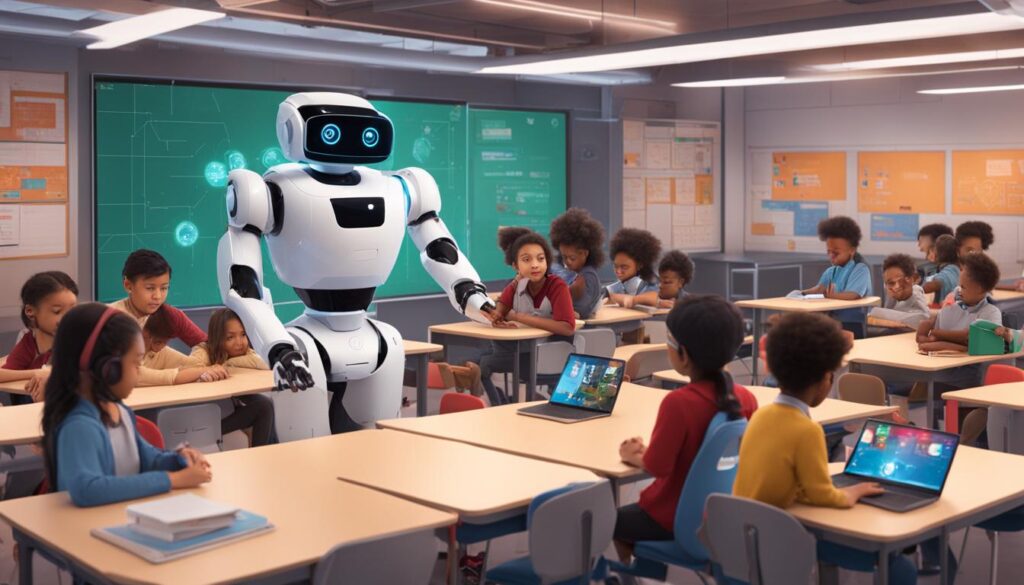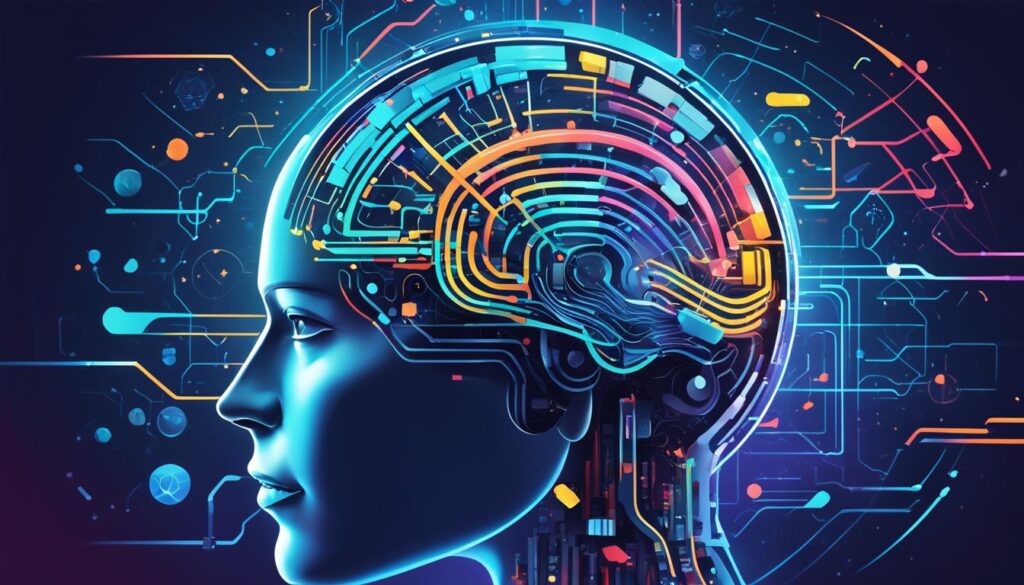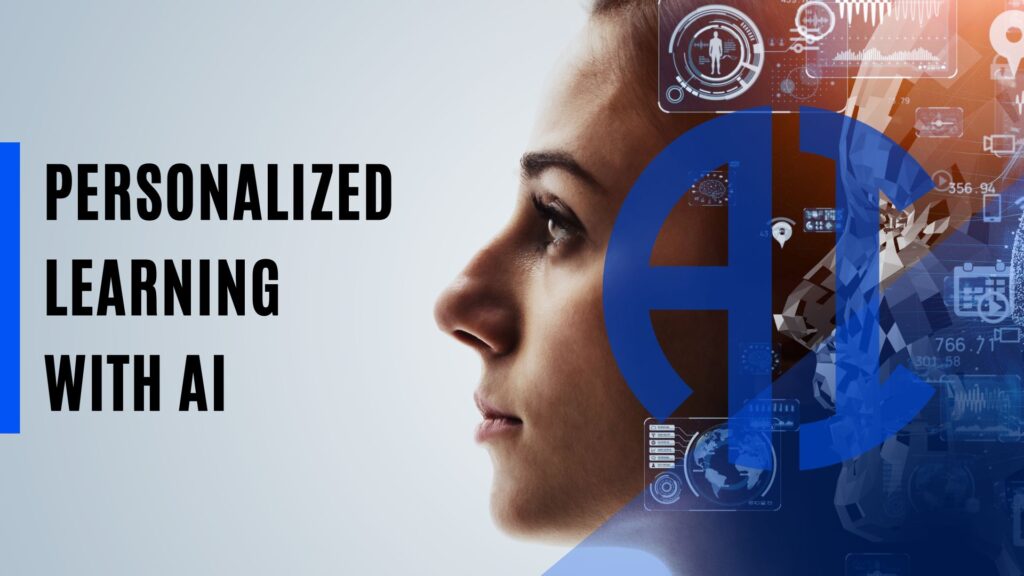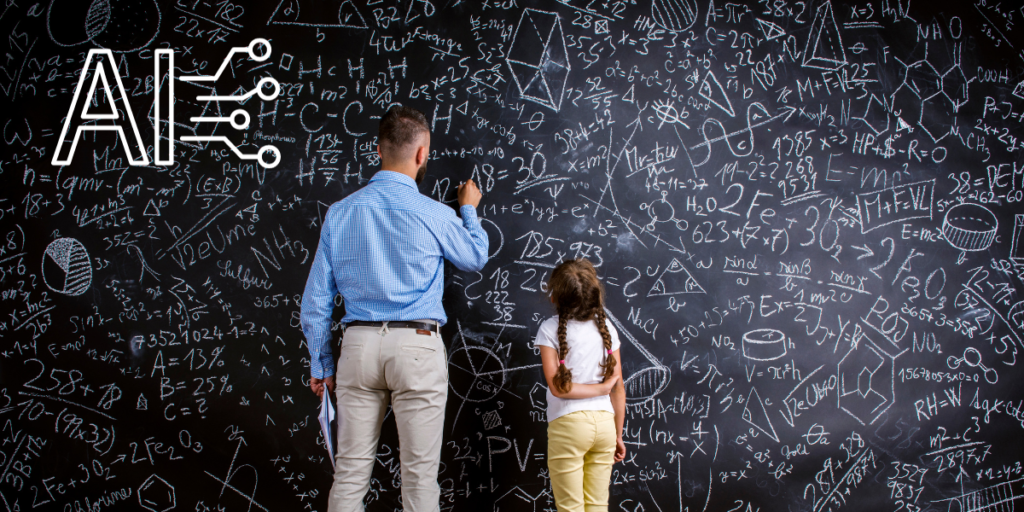
Artificial intelligence (AI) is revolutionizing the education landscape, offering new possibilities to enhance personalized learning experiences. By harnessing adaptive learning with AI, educators can tailor instruction to individual student needs, leading to better engagement, mastery of concepts, and overall student success.
AI-powered adaptive learning platforms utilize advanced algorithms to analyze student data and create customized learning paths. These platforms leverage adaptive learning technology and algorithms to deliver personalized content based on students’ skill levels, learning preferences, and interests. This personalized approach allows students to learn at their own pace, ensuring they receive the support they need at every step of their educational journey.
Furthermore, AI-driven adaptive learning goes beyond content delivery. It enables real-time feedback, allowing students to correct misconceptions and deepen their understanding immediately. With AI in education, assessment becomes more comprehensive, providing educators with valuable insights into each student’s progress and enabling them to intervene when necessary.
Implementing AI in education requires a gradual approach, starting small and refining practices over time. Teachers should review district policies, have conversations with students about responsible technology use, and continuously evaluate the effectiveness of AI-powered tools. By embracing adaptive learning solutions driven by AI, educators can unlock the full potential of personalized learning, fostering a generation of empowered and successful learners.
The Evolution of Education 4.0 and AI
Education 4.0, a learning technique connected to the fourth industrial revolution, is dedicated to the transformation of education using advanced technology and automation. In this era of education, artificial intelligence (AI) plays a pivotal role, enabling personalized learning experiences and providing data-driven insights.
One of the key components of AI in education is adaptive learning, which allows for individualized learning paths tailored to each student. AI-powered platforms analyze student performance and learning patterns to offer personalized educational content and pathways that cater to their unique needs and learning styles. This personalized approach boosts engagement and learning outcomes.
Intelligent tutoring systems further enhance the learning experience by simulating one-on-one interactions between students and virtual tutors. These systems provide immediate feedback, personalized teaching strategies, and adaptive learning materials to support students in their learning journey.
The collection and analysis of educational data are crucial for optimizing teaching strategies and curriculum design. AI-driven insights derived from student data help educators make informed decisions and tailor their instructional approaches for maximum effectiveness.
Natural Language Processing (NLP) is another important aspect of AI in education. NLP enables seamless communication through voice recognition and chatbots, making interactions between students, teachers, and AI-powered systems more natural and engaging.
Gamification and immersive experiences are also made possible by AI, enhancing student engagement and making the learning process more enjoyable. By incorporating elements of game design and virtual reality, AI-powered educational technologies create interactive and immersive learning environments that promote active participation and deeper understanding.
Related Post: Explore The Top 10 AI Tools For Education in 2024
Furthermore, AI automates content creation, saving educators time and effort by tailoring resources and materials to students’ specific needs and learning preferences.
Inclusivity in education is also a priority with the integration of AI. AI-powered assistive technologies provide support for students with disabilities and special learning needs, ensuring that educational opportunities are accessible to all.
Continuous assessment and feedback are integral to AI in education. Automated assessment systems and personalized feedback offer students real-time guidance on their progress, enabling them to track their development and make targeted improvements.
Advantages and Challenges of Adaptive Learning with AI
Advantages of AI in Education
AI in education offers numerous advantages that can enhance the learning experience for students and educators alike.
The use of automated feedback and grading systems saves time for educators, allowing them to focus on more creative and interactive teaching methods. This promotes a dynamic and engaging learning environment.
AI-powered personalized learning paths cater to the individual needs of students, enabling them to learn at their own pace and in their own preferred style. This not only fosters increased engagement but also improves comprehension and retention of information.
AI chatbots provide valuable out-of-hours student support, ensuring that students have access to assistance whenever they need it. Additionally, chatbots can also assist with career services, offering guidance and information on various career pathways.
Data-driven insights generated by AI systems allow educators to optimize their teaching strategies and improve student outcomes. By analyzing student performance data, educators can identify areas of improvement and tailor their instruction accordingly.
Natural Language Processing (NLP) capabilities of AI enable more natural and interactive communication between educators and students. This enhances the overall learning experience and facilitates better understanding and engagement.
Gamification and immersive technologies, powered by AI, make learning a fun and exciting experience. By incorporating elements of gaming and virtual reality, AI encourages active participation and motivation among students.
AI streamlines the development of educational resources, ensuring that materials are tailored to the specific needs of students. This not only saves educators time but also ensures that learning materials are effective and relevant.
AI-powered assistive technologies empower students with disabilities, promoting inclusivity in education. By providing customized support and accommodations, AI helps bridge the gap and ensures that all students have equal access to education.
Continuous assessment and feedback provided by AI systems help students track their progress and receive personalized guidance. This allows students to be more self-aware of their strengths and weaknesses, aiding in their overall academic growth.
Challenges of AI in Education

Despite its numerous advantages, the integration of AI in education also presents certain challenges that need to be addressed.
One key challenge is ensuring equitable access to AI-powered educational technologies. It is important to bridge the digital divide and ensure that all students have equal access to these resources, regardless of their socioeconomic background or geographical location.
Faculty training is vital for the successful implementation of AI in education. Educators need to be effectively trained to understand and utilize AI technologies to their full potential. Providing comprehensive training programs can empower educators to integrate AI seamlessly into their teaching practices.
Plagiarism is a concern when utilizing AI-based tools for assessment and content creation. It is crucial to develop robust systems that can detect and prevent plagiarism, ensuring academic integrity and authenticity.
Data concerns arise due to the collection and storage of large amounts of student data. Safeguarding sensitive information and ensuring privacy is of utmost importance. Institutions must establish stringent data protection measures and comply with relevant regulations to protect student privacy.
The advantages of AI in education are significant, but it is crucial to address the challenges and concerns associated with its implementation. By taking a thoughtful and proactive approach, education can harness the full potential of AI while ensuring equal access, faculty readiness, plagiarism prevention, and data privacy.
Related Post: The Best AI Tools For Students Everyone Should Know in 2024
The Impact of AI on Education: Worth the Risks?

Adaptive learning with AI is revolutionizing education and elevating the quality of teaching and learning. AI-powered technologies bring forth personalized, engaging, and effective learning experiences that cater to the unique needs of each student. By harnessing the power of AI, students are empowered to take ownership of their education, fostering a deeper understanding of the subject matter.
Data-driven insights and innovative technologies reshape the educational landscape by providing educators with valuable information about student performance, learning patterns, and preferences. This allows for the development of tailored teaching strategies and curriculum designs that optimize student outcomes.
The future of education lies in the hands of AI technology. Its transformative potential offers a more accessible, inclusive, and impactful educational experience for all. Through AI, barriers to access are dismantled, ensuring that education reaches students regardless of their geographical location, socioeconomic background, or physical limitations.
While integrating AI into education may present challenges, these obstacles should be seen as investments in future success and growth. By addressing concerns about access, faculty training, plagiarism, and data privacy, educational institutions can confidently navigate the educational transformation facilitated by AI.
Embracing AI in education will undoubtedly lead to a brighter future for learners and educators alike. The impact of AI on education is worth pursuing, as it paves the way for a dynamic and cutting-edge educational landscape that prepares students for the challenges and opportunities of the future.
Conclusion
Adaptive learning with AI has the potential to revolutionize education, making it more personalized, engaging, and effective. With AI-powered technologies, students can benefit from tailored learning paths, intelligent tutoring systems, data-driven insights, and immersive experiences.
However, the adoption of AI in education comes with its own set of challenges. It is crucial to address accessibility issues, provide faculty training, ensure academic integrity by tackling plagiarism concerns, and prioritize data security. By acknowledging and actively working to overcome these challenges, we can embrace AI in education as a proactive and forward-thinking approach to nurture student development and institutional growth.
Looking ahead, the future of learning is shaped by AI-powered technologies in the classroom. It offers exciting possibilities for a more accessible, inclusive, and impactful learning environment. As we continue to navigate this evolving landscape, we must remain committed to leveraging AI in education to unlock the full potential of every learner and pave the way for a brighter future of learning.
Related Post: Exploring the Best 20 AI Tools For Teachers in 2024
FAQ
How is AI used in education?
AI is used in education to deliver personalized and adaptive learning experiences. It utilizes adaptive learning algorithms and AI-powered platforms to create individualized learning paths, provide instant feedback, and optimize teaching strategies.
What are the advantages of AI in education?
AI in education offers automated feedback and grading systems, personalized learning paths, out-of-hours student support through chatbots, data-driven insights for optimization, enhanced communication through NLP, engaging learning experiences through gamification and immersive technologies, streamlined content creation, support for students with disabilities, and continuous assessment and feedback for personalized guidance.
What are the challenges of integrating AI in education?
Some challenges of integrating AI in education include ensuring access for all students, providing faculty training for AI implementation, addressing concerns about plagiarism in automated grading systems, and ensuring data privacy and security.
How does AI impact education?
AI in education has a significant impact by revolutionizing the learning experience. It empowers students with personalized and engaging learning experiences, promotes deeper understanding, enables data-driven insights for optimization, enhances accessibility and inclusivity, and transforms the educational landscape.
Is the integration of AI in education worth the risks?
Yes, the integration of AI in education is worth the risks as it offers numerous benefits such as personalized and effective learning experiences, optimized teaching strategies, and a more accessible and impactful future of education. Embracing AI in education is a proactive approach to nurture student development and institutional growth.
What is the future of AI in education?
The future of AI in education promises a more personalized, engaging, and effective learning experience. It will continue to shape the educational landscape, offering innovative technologies, data-driven insights, and transformative teaching practices.
How can AI support teachers in the classroom?
AI can support teachers in the classroom by automating certain tasks such as grading and content creation, allowing them to focus on individualized instruction and providing one-on-one support to students. It also offers immediate feedback and continuous support, enabling teachers to track student progress and offer personalized guidance.

